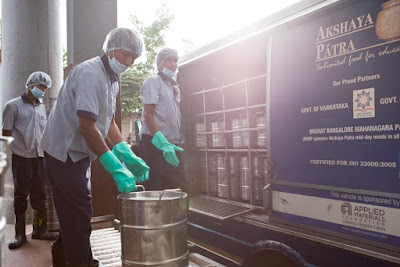The Akshaya Patra Foundation is a mid-day meal NGO in India. It has been in the service of children since 2000. The Foundation has been recognised as the world’s largest NGO-run school meal programme. It runs the programme in a Public-Private Partnership model receiving aid from Central and various State Governments including help from Corporate and individual donors. The NGO aims to provide unlimited food for education and is aware of its responsibility in providing nutritious, hygienic, and clean food to children. Typically, a centralised Akshaya Patra kitchen has the capacity to cook up to 100,000 meals and to increase efficiency and productivity, the Foundation has adopted various technologies in the kitchen operations. Several Corporate partners have helped the Foundation in the endeavour of introducing technological intervention in the kitchens. Here are five main technologies adopted in the kitchens:
1. Roti-making machine – Since roti (Indian flatbread) is a staple item in the North Indian menu, the North Indian kitchens are equipped with roti making machines, with the capacity to roll out up to 200,000 rotis from 6000 kilograms of wheat flour. This enhances hygiene and efficiency since the whole process is mechanised and there is minimal human intervention.
2. Hot insulated vessels and vehicles – The Foundation makes use of hot insulated vessels and vehicles to pack and deliver cooked meals to schools. The use of insulation technology ensures that the meals remain fresh until it is consumed by children. To aid this, State Bank of India, one of The Foundation’s Corporate partners have recently contributed INR 88 lakhs for the procurement of insulated vessels.
3. Conveyor belt – In order to increase efficiency during the loading process, the kitchens are equipped with conveyor belts. After packing, the containers are sent on a conveyor belt that gets loaded into customised insulated meal delivery vehicles.
4. GPRS in meal delivery vans – The Foundation has incorporated GPRS technology in its meal delivery vehicles to ensure safety and on-time delivery of meals.
5. Eco-friendly interventions - Aside from regular technological interventions, the NGO has also adopted green technologies such as biogas plant, briquette boiler, and solar power in some of its kitchens to reduce carbon footprint and operational cost.
Recently, the Foundation inaugurated its hi-tech mega kitchen at Kandi, Telangana. This is the largest among all the existing kitchens. The Infosys Foundation, one of the NGO’s Corporate partners have funded the construction of this mega kitchen. Some of the salient technologies in this kitchen are:
- Silikal Industrial Flooring - It is a completely non-porous, seamless, sealed surface thereby reducing the colonization by microbes and bacteria and contributing to better hygiene. It is skid resistant and prevents accidental slips and falls, plus it has a long durability with limited maintenance and lower lifecycle cost.
- ReFlex Reverse Osmosys System – It is a water purifying system to make water more potable. Flexible operation and resistance to scaling and fouling greatly improve the reliability of ReFlex RO systems.
- COMBLOCK Boiler for Steam Generation – It is the latest in Boiler Technology which combines the best of Integrated Furnace Boiler and Hybrid Boiler. While increasing efficiency by up to 85%, it can also reduce carbon footprint by up to 40%.
- ANDICOS Waste to Energy Generation System – It is a technology to treat a combination of solid waste generated in sewage treatment process and organic kitchen waste generated in the kitchen.
To know more about the technologies used, visit: Kandi Kitchen
The ReFlex Reverse Osmosys System and ANDICOS Waste to Energy Generation System are the first of its kind technologies in India. Aside from the above-mentioned technologies, this NGO in India has also adopted Kaizen, Continuous Improvement Projects, and Six Sigma methodologies as an integral part of kitchen operations.
By taking these measures Akshaya Patra is continuously improvising and enhancing its role as a mid-day meal NGO. And, these features are solely being adopted in Akshaya Patra kitchens to enhance hygiene, increase operational efficiency, reduce cost, reduce carbon footprint, and most importantly to provide nutritious and safe meals to over 1.7 million children across 12 states of India, on every school day.

















0 comments:
Post a Comment